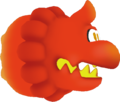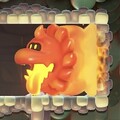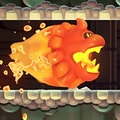Raargh
| Raargh | |||
|---|---|---|---|
 Artwork | |||
| First appearance | Super Mario Bros. Wonder (2023) | ||
| Variant of | Magmaargh | ||
| |||
Raarghs are fiery enemies that appear in Super Mario Bros. Wonder. They are a variety of Magmaarghs that act similarly to Thwomps.
Raarghs only appear in one level—the Deep Magma Bog level Raarghs in the Ruins. They attach themselves to the ground and wait for a player to get near, in which case they charge straight forward in the direction they were facing. If one charges into the environment or another Raargh, they disappear. They are capable of activating Rotating Blocks and ? Blocks. After several seconds, the Raargh will respawn in its original location. According to a Japanese article, Raarghs are very sensitive to heat and stick out their tongues to regulate their body temperature.[1]
Raarghs continue the theme of enemies such as Blargg and Magmaargh having names that include the onomatopoeia "arg" in some form.
Gallery[edit]
Naming[edit]
Internal names[edit]
| Game | File | Name | Meaning
|
|---|---|---|---|
| Super Mario Bros. Wonder | Model/EnemyMagumaDossun.bfres.zs | MagumaDossun | Magma Thwomp |
Names in other languages[edit]
| Language | Name | Meaning | Notes |
|---|---|---|---|
| Japanese | ウーロン[?] Ūron |
Portmanteau of「ウーガン」(Ūgan, "Magmaargh") and「龍」(lóng, "dragon" in Chinese); pronounced identically to oolong (from「烏龍」(wūlóng), a Chinese word meaning "black dragon") | |
| Chinese (traditional) | 乌龙熔岩[2] Wūlóng Róngyán |
Portmanteau of「乌龙」(wūlóng, "Oolong") and「乌卡熔岩」(Wūkǎ Róngyán, "Magmaargh") | |
| French | Dravalave[?] | Portmanteau of dragon and Avalave ("Magmaargh") | |
| German | Glutdrako[?] | Ember Dragon; compare Glutsauger ("Magmaargh") | |
| Italian | Magmadrago[?] | Magma-dragon; compare Magmabruto ("Magmaargh") | |
| Korean | 짜자룡[3] Jjajaryong |
Portmanteau of "짜자용" (Jjajayong, "Magmaargh") and "龍" (ryong, "dragon" in Sino-Korean, widely used in North Korea) | |
| Portuguese | Leomaargh[?] | From "Magmaargh" and the prefix form of leão ("lion") | |
| Russian | Дракмарод[?] Drakmarod |
Possibly from дракон (drakon, "dragon"), кошмар (koshmar, "nightmare") and род (rod, root similar to "gen") | |
| Spanish | Lavonchof[?] | Portmanteau of Lavoncio ("Magmaargh") and chof (onomatopoeia for splashing) |
References[edit]
- ^ (January 26, 2024). マリオたちの行く手を阻む。フラワー王国の個性豊かな敵キャラクターをご紹介。~その1~【ワンダーの世界へ Vol.13】. nintendo.co.jp. Retrieved January 26, 2024.
- ^ Nintendo (Hong Kong) Ltd. (23 Feb. 2024). 阻擋瑪利歐一行人的去路。將為您介紹花花王國充滿個人特色的敵方角色。~第一篇~【前往驚奇的世界 Vol.13】. Nintendo Official Site (Traditional Chinese). Retrieved 31 Mar. 2025.
- ^ February 8, 2024. 마리오와 친구들을 방해한다. 플라워 왕국에서 만날 수 있는 개성 넘치는 적 캐릭터를 소개. ~제1편~【원더의 세계로 Vol.13】. nintendo.co.kr (Korean). Retrieved February 13, 2024.


